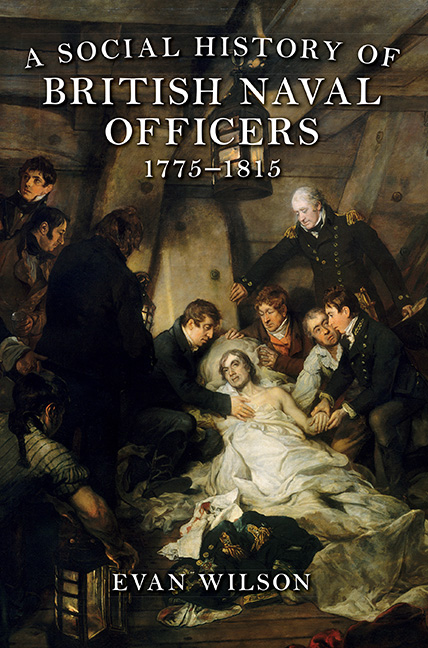Book contents
- Frontmatter
- Dedication
- Contents
- List of Illustrations
- Acknowledgements
- Abbreviations and Conventions
- Introduction
- 1 The Education of Young Gentlemen
- 2 Commissioned Officers’ Careers
- 3 Warrant Officers’ Careers
- 4 The Wardroom as a Social Space
- 5 Patronage and Promotion Prospects
- 6 Pay and Prize Money
- 7 Domestic and International Comparisons
- 8 Naval Officers’ Social Status
- Conclusion
- Appendix
- Bibliography
- Index
8 - Naval Officers’ Social Status
Published online by Cambridge University Press: 20 April 2017
- Frontmatter
- Dedication
- Contents
- List of Illustrations
- Acknowledgements
- Abbreviations and Conventions
- Introduction
- 1 The Education of Young Gentlemen
- 2 Commissioned Officers’ Careers
- 3 Warrant Officers’ Careers
- 4 The Wardroom as a Social Space
- 5 Patronage and Promotion Prospects
- 6 Pay and Prize Money
- 7 Domestic and International Comparisons
- 8 Naval Officers’ Social Status
- Conclusion
- Appendix
- Bibliography
- Index
Summary
In the last seven chapters, we have flirted with questions of naval officers’ social status and whether they were gentlemen. This chapter addresses these questions directly. Answering them is important for understanding the world of eighteenth-century Britain and her navy, perhaps more so than modern readers might expect. First, recall Collingwood's proclamation from Chapter 5 that he sought enterprising and diligent officers who were also gentlemen. On the quarterdeck, gentility was prized alongside merit. Keith wrote of an officer who carried his dispatches in 1796, ‘I beg leave to mention him to their Lordships as a respectable gentleman and an active officer.’ Nelson's advice to a young officer was quoted at the beginning of the book: ‘Recollect that you must be a Seaman to be an Officer, and also, that you cannot be a good Officer without being a Gentleman.’ Second, on land, social status shaped interpersonal interactions in ways that are difficult to understand today. The middling sort sought the affirmation and prestige of genteel status; the landed classes worried about the marriage market and the acceptability of working for a living; and the elite sought to reinforce their dominance in the face of threats both domestic and foreign.
Despite its importance, social status is notoriously difficult to define. It is often easier to say what it was not than what it was. Social status is not equivalent to class, in the Marxist sense. For the men of this book, sometimes it was a rank, defined by birth, title, and income; sometimes it was a description of behaviour, defined by education, occupation, and manners. None of these definitions were precise. To deal with the confusion, one historian proposed ‘The Four Variables of Status’, a general formula for understanding social status in a time and place. The variables are: how different social status is from other kinds of power; what characteristics are valued; whether status is hereditary; and whether status is institutionalised and regulated. In eighteenth- century Britain, we can say that social status was tied closely to other kinds of power, though economic power was not a guarantee of social status.
- Type
- Chapter
- Information
- A Social History of British Naval Officers, 1775-1815 , pp. 185 - 222Publisher: Boydell & BrewerPrint publication year: 2017



